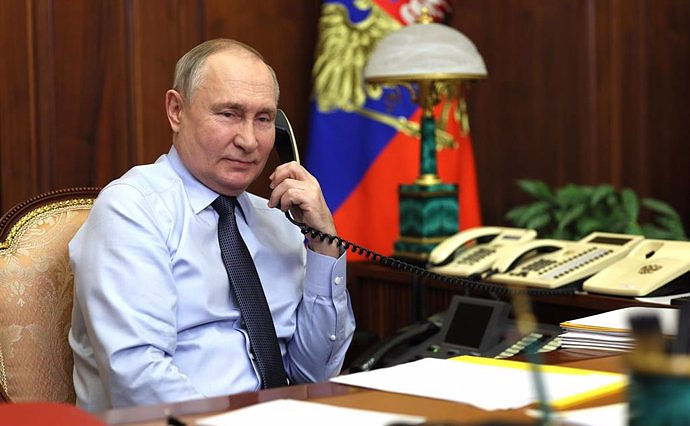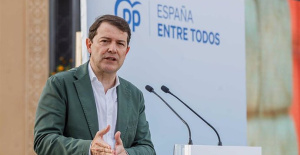The president only has three rivals after more than a dozen candidates have been disqualified
MADRID, 14 Mar. (EUROPA PRESS) -
Russia heads to the polls this Friday in the framework of historic elections that will last three days and in which the Russian president, Vladimir Putin, once again starts as a favorite in the absence of a real opposition to challenge a president who continues to sow doubts at the international level about its democratic legitimacy.
The politician, who at 71 years old continues to shape a personalist policy, has restored symbols of the USSR and has gone so far as to criminalize any form of equating the former Soviet Union with Nazism, against which he claims to fight in Ukraine in defense of "Russian culture."
While most votes will be cast between Friday and Sunday at polling stations across the country, mail-in voting began almost a week ago abroad, including in parts of eastern Ukraine annexed by Russia in 2022. although some areas remain under the control of Ukrainian forces.
From Kiev they denounce threats and acts of violence precisely against residents of these provinces, who would be pressured to go to the polls against their will, something that has been rejected by Moscow, which insists on considering Jerson, Zaporiyia, Donetsk and Lugansk as "liberated" regions.
There are many who stipulate that these are not normal elections: Putin's power over the Russian electoral system has already provoked criticism and condemnation for alleged electoral fraud in the past.
The list of presidential candidates has been reduced to four after Boris Nadezhdin - the only candidate critical of the war in Ukraine - was left out of the electoral race. He is joined by more than a dozen politicians whose candidacies have been rejected by the Central Election Commission, so Putin only has three rivals, none of them strong enough to threaten his position in the Kremlin.
The official candidates, the nationalist and conservative Leonid Slutski, leader of the Liberal Democratic party of Russia, the communist Nikolai Jaritonov and Vladislav Davankov, a businessman from the New People party, have always shown their support for the Russian invasion of Ukraine.
Voices critical of his Government continue to denounce acts of repression and persecution against dissidents, a position that has recently gained strength after the death of Alexei Navalni, one of the most recognized faces of the Russian opposition. The case has led the international community to brand the Russian head of state as a "murderer" considering that his death in prison responds to the Government's actions to silence those who confront the president.
Leonid Volkov, collaborator and former campaign manager of the deceased dissident, has also spoken along these lines, who has directly accused Putin of the hammer attack suffered on Tuesday in front of his home in the capital of Lithuania, Vilnius, and which has left him various injuries to a leg, an arm and the face. The opponent has blamed what happened on the "gangster" behavior of the Russian president, but has stated that he will continue "working" to confront it.
As the opposition denounces the holding of "undemocratic" elections, voting intention polls conducted by the Russian Public Opinion Research Center (VCIOM) give Putin victory with 75 percent of support. The rest of the candidates, who have also shown their support for the Kremlin and have significantly backed his policies, would be far behind.
This is why figures such as Navalni's widow, Yulia Navalnaya, have called on the population to take to the streets on the occasion of the elections to protest at 12:00 (local time) on March 17 at the voting centers in throughout the country, an initiative known as 'Noon against Putin' and which was already presented by Navalny before his death.
Putin has led the country for much of the 21st century, making him the longest-serving Russian official since Joseph Stalin. A native of Saint Petersburg, Putin rose to office after winning the 2000 elections. After that, he has accumulated comfortable absolute majorities that have helped him triumph in a total of four presidential votes.
However, and prevented by the Constitution, he had to resign in 2008 from a possible third term and ran for the position of prime minister. The Presidency was then under the command of Dimitri Medvedev for four years, with whom Putin later alternated the position.
To ensure his continuity in office, Putin has rewritten the laws and regulations of the Russian political system, which led him to extend his mandates - from four to six years - in a constitutional reform promoted in 2008. Subsequently, in April 2021, enacted a law that will allow him to accumulate two more mandates, so that he could run, precisely, in the 2024 elections, but also in the 2030 elections, something that had been banned until then.
The regulations establish as a general principle a maximum of two terms of six years each for the head of state, which could lead Putin to govern until 2036. The modifications related to the Presidency were included within a package of changes that They consider that candidates must be at least 35 years old, have lived permanently in Russia for at least 25 years, and not have citizenship or a residence permit in another country. In addition, the reforms modify the functions of the Executive and the legislative branch and expressly prohibit the secession of the territories that make up Russia.
Putin, who currently enjoys an improved level of popularity among the Russian population as troops advance to the front in Ukraine, has highlighted the strength and resilience of the Russian economy in the face of attempts by the international community to exert significant pressure on the Kremlin with significant sanctions.
However, the Russian president continues to refuse to participate in an electoral debate and, failing that, has preferred to address the population during his annual speech to Parliament, in which he has said he has enough weapons to hit the West and has promised allocate millions of rubles to modernize the country's schools and infrastructure.
The speech, which contained information on the introduction of policies for the next decade, included information on new troop deployments to the Russian western flank in light of the expansion of NATO and the accession of Sweden and Finland to the Alliance.
Subsequently, Putin has accused the United States of trying to interfere in the electoral process and has indicated that it is the American president, Joe Biden, who has given guidelines to the country's NGOs to encourage low participation in the elections. With this low participation, he explained, Washington seeks to "question the results of the elections" in order to talk about electoral fraud.
Therefore, he has asked citizens, both in Russia and in the annexed territories in eastern Ukraine, to vote to determine the future of the country in a "difficult time." For the president, who faces the last day before the elections focused on the intensification of the offensive in Ukraine, participation represents an "act of patriotism."

 Exploring Cardano: Inner Workings and Advantages of this Cryptocurrency
Exploring Cardano: Inner Workings and Advantages of this Cryptocurrency Seville.- Economy.- Innova.- STSA inaugurates its new painting and sealing hangar in San Pablo, for 18 million
Seville.- Economy.- Innova.- STSA inaugurates its new painting and sealing hangar in San Pablo, for 18 million Innova.- More than 300 volunteers join the Andalucía Compromiso Digital network in one month to facilitate access to ICT
Innova.- More than 300 volunteers join the Andalucía Compromiso Digital network in one month to facilitate access to ICT Innova.-AMP.- Ayesa acquires 51% of Sadiel, which will create new technological engineering products and expand markets
Innova.-AMP.- Ayesa acquires 51% of Sadiel, which will create new technological engineering products and expand markets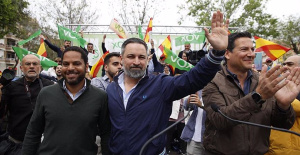 Abascal (Vox) criticizes that Sánchez is "victimizing" himself and calls for elections after his possible resignation
Abascal (Vox) criticizes that Sánchez is "victimizing" himself and calls for elections after his possible resignation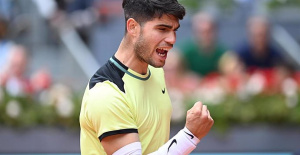 Carlos Alcaraz reaches the round of 16 in Madrid without breaking a sweat
Carlos Alcaraz reaches the round of 16 in Madrid without breaking a sweat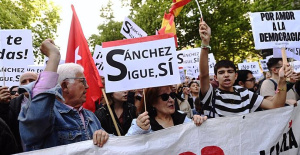 Some 5,000 people demonstrate in front of Congress for democracy, hours before Sánchez's decision
Some 5,000 people demonstrate in front of Congress for democracy, hours before Sánchez's decision STATEMENT: Intelligent systems used in the construction of the deepest underwater tunnel in China
STATEMENT: Intelligent systems used in the construction of the deepest underwater tunnel in China How Blockchain in being used to shape the future
How Blockchain in being used to shape the future Not just BTC and ETH: Here Are Some More Interesting Coins Worth Focusing on
Not just BTC and ETH: Here Are Some More Interesting Coins Worth Focusing on UPV students build a prototype of a wooden house to move to Equatorial Guinea
UPV students build a prototype of a wooden house to move to Equatorial Guinea The UA opens the call for the Impulso 2024 Awards for the best innovative business initiatives
The UA opens the call for the Impulso 2024 Awards for the best innovative business initiatives ALI, virtual assistant from Alicante, internationally recognized by the OECD
ALI, virtual assistant from Alicante, internationally recognized by the OECD Retrópolis brings the golden age of video games and computing to the UPV
Retrópolis brings the golden age of video games and computing to the UPV A million people demonstrate in France against Macron's pension reform
A million people demonstrate in France against Macron's pension reform Russia launches several missiles against "critical infrastructure" in the city of Zaporizhia
Russia launches several missiles against "critical infrastructure" in the city of Zaporizhia A "procession" remembers the dead of the Calabria shipwreck as bodies continue to wash up on the shore
A "procession" remembers the dead of the Calabria shipwreck as bodies continue to wash up on the shore Prison sentences handed down for three prominent Hong Kong pro-democracy activists
Prison sentences handed down for three prominent Hong Kong pro-democracy activists ETH continues to leave trading platforms, Ethereum balance on exchanges lowest in 3 years
ETH continues to leave trading platforms, Ethereum balance on exchanges lowest in 3 years Investors invest $450 million in Consensys, Ethereum incubator now valued at $7 billion
Investors invest $450 million in Consensys, Ethereum incubator now valued at $7 billion Alchemy Integrates Ethereum L2 Product Starknet to Enhance Web3 Scalability at a Price 100x Lower Than L1 Fees
Alchemy Integrates Ethereum L2 Product Starknet to Enhance Web3 Scalability at a Price 100x Lower Than L1 Fees Mining Report: Bitcoin's Electricity Consumption Declines by 25% in Q1 2022
Mining Report: Bitcoin's Electricity Consumption Declines by 25% in Q1 2022 Oil-to-Bitcoin Mining Firm Crusoe Energy Systems Raised $505 Million
Oil-to-Bitcoin Mining Firm Crusoe Energy Systems Raised $505 Million Microbt reveals the latest Bitcoin mining rigs -- Machines produce up to 126 TH/s with custom 5nm chip design
Microbt reveals the latest Bitcoin mining rigs -- Machines produce up to 126 TH/s with custom 5nm chip design Bitcoin's Mining Difficulty Hits a Lifetime High, With More Than 90% of BTC Supply Issued
Bitcoin's Mining Difficulty Hits a Lifetime High, With More Than 90% of BTC Supply Issued The Biggest Movers are Near, EOS, and RUNE during Friday's Selloff
The Biggest Movers are Near, EOS, and RUNE during Friday's Selloff Global Markets Spooked by a Hawkish Fed and Covid, Stocks and Crypto Gain After Musk Buys Twitter
Global Markets Spooked by a Hawkish Fed and Covid, Stocks and Crypto Gain After Musk Buys Twitter Bitso to offset carbon emissions from the Trading Platform's ERC20, ETH, and BTC Transactions
Bitso to offset carbon emissions from the Trading Platform's ERC20, ETH, and BTC Transactions Draftkings Announces 2022 College Hoops NFT Selection for March Madness
Draftkings Announces 2022 College Hoops NFT Selection for March Madness